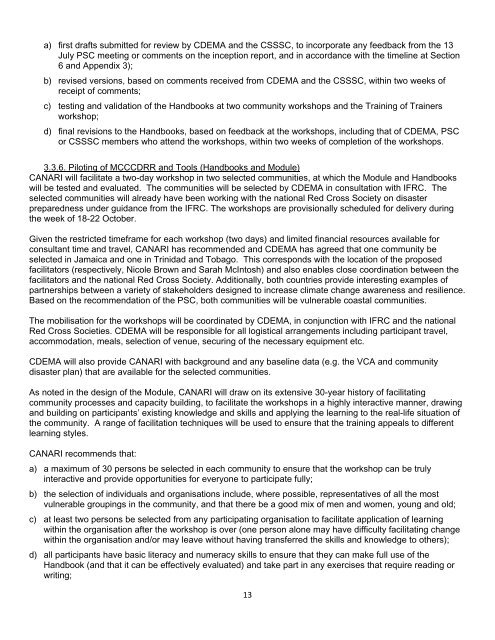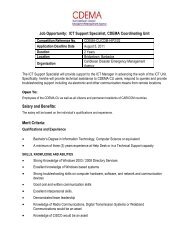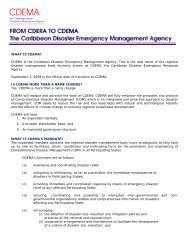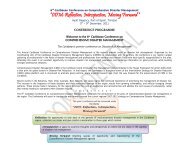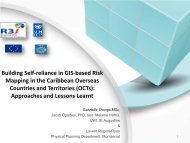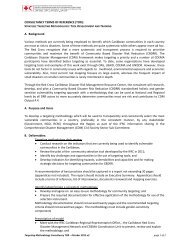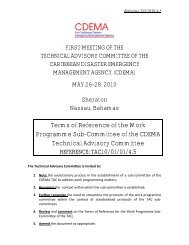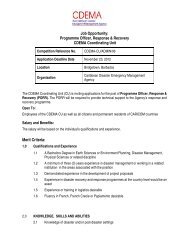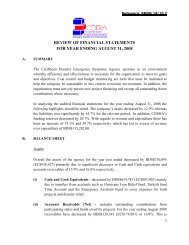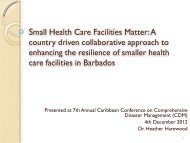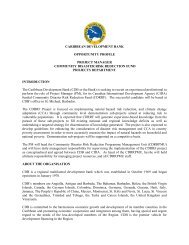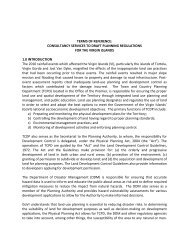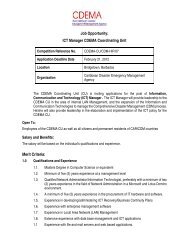Create successful ePaper yourself
Turn your PDF publications into a flip-book with our unique Google optimized e-Paper software.
a) first drafts submitted for review by <strong>CDEMA</strong> and the CSSSC, to incorporate any feedback from the 13<br />
July PSC meeting or comments on the inception report, and in accordance with the timeline at Section<br />
6 and Appendix 3);<br />
b) revised versions, based on comments received from <strong>CDEMA</strong> and the CSSSC, within two weeks of<br />
receipt of comments;<br />
c) testing and validation of the Handbooks at two community workshops and the Training of Trainers<br />
workshop;<br />
d) final revisions to the Handbooks, based on feedback at the workshops, including that of <strong>CDEMA</strong>, PSC<br />
or CSSSC members who attend the workshops, within two weeks of completion of the workshops.<br />
3.3.6. Piloting of MCCCDRR and Tools (Handbooks and Module)<br />
CANARI will facilitate a two-day workshop in two selected communities, at which the Module and Handbooks<br />
will be tested and evaluated. The communities will be selected by <strong>CDEMA</strong> in consultation with IFRC. The<br />
selected communities will already have been working with the national Red Cross Society on disaster<br />
preparedness under guidance from the IFRC. The workshops are provisionally scheduled for delivery during<br />
the week of 18-22 October.<br />
Given the restricted timeframe for each workshop (two days) and limited financial resources available for<br />
consultant time and travel, CANARI has recommended and <strong>CDEMA</strong> has agreed that one community be<br />
selected in Jamaica and one in Trinidad and Tobago. This corresponds with the location of the proposed<br />
facilitators (respectively, Nicole Brown and Sarah McIntosh) and also enables close coordination between the<br />
facilitators and the national Red Cross Society. Additionally, both countries provide interesting examples of<br />
partnerships between a variety of stakeholders designed to increase climate change awareness and resilience.<br />
Based on the recommendation of the PSC, both communities will be vulnerable coastal communities.<br />
The mobilisation for the workshops will be coordinated by <strong>CDEMA</strong>, in conjunction with IFRC and the national<br />
Red Cross Societies. <strong>CDEMA</strong> will be responsible for all logistical arrangements including participant travel,<br />
accommodation, meals, selection of venue, securing of the necessary equipment etc.<br />
<strong>CDEMA</strong> will also provide CANARI with background and any baseline data (e.g. the VCA and community<br />
disaster plan) that are available for the selected communities.<br />
As noted in the design of the Module, CANARI will draw on its extensive 30-year history of facilitating<br />
community processes and capacity building, to facilitate the workshops in a highly interactive manner, drawing<br />
and building on participants’ existing knowledge and skills and applying the learning to the real-life situation of<br />
the community. A range of facilitation techniques will be used to ensure that the training appeals to different<br />
learning styles.<br />
CANARI recommends that:<br />
a) a maximum of 30 persons be selected in each community to ensure that the workshop can be truly<br />
interactive and provide opportunities for everyone to participate fully;<br />
b) the selection of individuals and organisations include, where possible, representatives of all the most<br />
vulnerable groupings in the community, and that there be a good mix of men and women, young and old;<br />
c) at least two persons be selected from any participating organisation to facilitate application of learning<br />
within the organisation after the workshop is over (one person alone may have difficulty facilitating change<br />
within the organisation and/or may leave without having transferred the skills and knowledge to others);<br />
d) all participants have basic literacy and numeracy skills to ensure that they can make full use of the<br />
Handbook (and that it can be effectively evaluated) and take part in any exercises that require reading or<br />
writing;<br />
13


